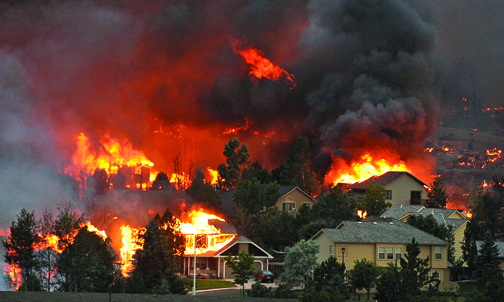
by Mark Smiley | Jan 29, 2018 | Main Articles
Denver Ranked Country’s Sixth Most Endangered City; Audit Finds City Isn’t Disaster Ready
by Glen Richardson

Sparking Fear: Winds and hot, dry weather spark fire danger that can change rapidly. The state’s largest — the Hayman Fire — killed five firefighters, destroyed 133 homes and burned 137,000 acres between Colorado Springs and Denver.
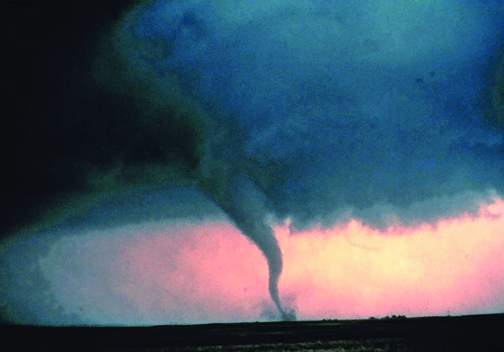
Tornado Alley: Denver has avoided a major tornado but in May 2008, just 59 miles north, the town of Windsor was declared a national disaster. The twister killed one and caused $125 million in damages.
Despite the horrific damage inflicted upon Houston, the Florida Keys and Puerto Rico by hurricanes last year, most Cherry Creek Valley residents think they’re relatively safe from Mother Nature compared to most major metro areas. Wrong: Five counties in Colorado — mostly along the urban corridor — are ranked as very high risks. Fact: Denver is the sixth most endangered major city in the country. Moreover, the likelihood for mass shootings, wildfires and terror attacks are equally likely here as anywhere.
To make matters worse the City of Denver is not prepared to continue non-emergency but mission-essential services in the event of a disaster. In a just released appraisal City Auditor Timothy M. O’Brien, CPA, found that insufficient guidance and training could mean a longer recovery period before city agencies restore vital services after a man-made or natural disaster.
Worst Case Scenario
“If the worst should happen, Denver needs to be ready to respond to keep city services going,” Auditor O’Brien warns. “If we faced an extreme weather event, pandemic, terrorist attack or another disaster, we’d need to know Denver could bounce back and continue serving its citizens.”
Non-emergency, mission-essential operations include a broad swath of services the city provides, ranging from assistance to vulnerable populations to services for citizens.
The audit looked at whether agencies had “continuity of operations” plans that would be effective in the event of an emergency. The pla
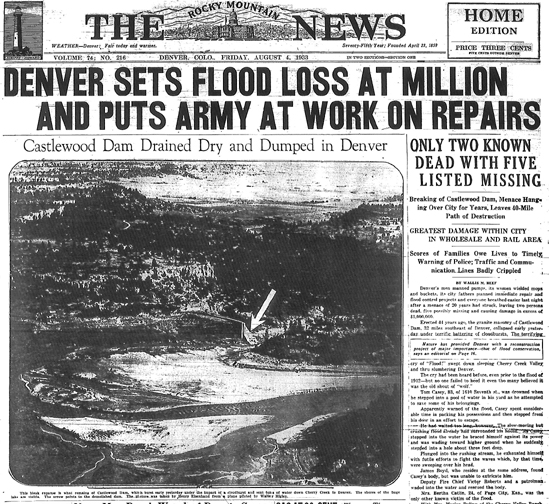
Wacky Weather: Drought combined with prolonged storms can create significant flooding as the Confluence Park photo and headline, above, from an old Rocky Mountain News [August 4, 1933] illustrate.
ns are created as a guid
e so each agency’s personnel know where to go and what to do in the case of an emergency. They are part of a greater “continuity of government” plan for Denver. Emergency services such as firefighters and police are not included in these plans. They are part of a separate emergency preparedness plan. Standards for effective continuity of operations plans are set by FEMA.
Front Line Flaws
After examining the operations of the Office of Emergency Management & Homeland Security, as well as the Office of Human Resources, the audit concluded the city does not have proper planning in place to ensure mission-essential services are up and running after a disaster. For example, the city’s continuity of operations plan lacks critical and up-to-date information. Denver’s continuity of operations plans are incomplete or ineffective according to FEMA standards. These flaws could lead to time-sensitive performance and operation issues, causing increased costs and potential damage to city infrastru
cture, services and reputation.
Mission-essential functions include front-line, time-sensitive services. Many city agencies provide critical services for the health and well-being of some of Denver’s most vulnerable populations, including children who benefit from summer food and after-school meal programs. If a disaster took out everyday functions, everything from paperwork and permitting to other time-sensitive services could fail. This could also mean tax dollars would be wasted if city agencies were not able to do work in a timely manner.
The audit found 29 out of 69 agencies had not reviewed their plans in 2017. Of those 29, three agencies had not reviewed their emergency plan since 2001. Five agenc
ies did not have a continuity of operations plan at all. The audit also found there was no training for the agencies on how to write an effective plan.
Tone At Top
The Office of Emergency Management & Homeland Security is supposed to collaborate with government agencies to help them prepare their continuity of operations plans, as directed by Executive Order 85. The order states all agencies should have these pla
ns. The Office of Emergency Management & Homeland Security is supposed to provide sufficient guidance and training to ensure agencies have complete and effective plans. The agency is also intended to ensure the plans are kept updated.
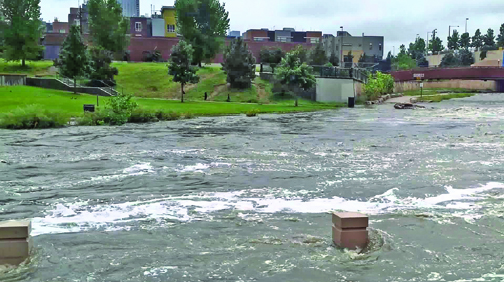
While the executive order is not specific about when agencies should update their plans, the continuity of government plan and FEMA both recommend annual updates. “The Office of Emergency Management & Homeland Security needs to set a tone at the top to encourage all agencies to make sure they are ready to keep working no matter what happens,” Auditor O’Brien suggests.
The office is primarily funded by federal grants. Recently more money has come from Denver’s general fund as federal funding decreases year after year. In total, the funding for the office continues to decrease. Specifically, the agency’s operating budget dropped from $5.1 million in 2015 to $3.8 million in 2017.
Prepare For Worst
The audit also found there might not be alternate facilities available for some agencies, which would leave employees without a designated place to continue working if they must leave their normal work spaces. The audit team also discovered Denver’s cloud-based continuity planning software contract lapsed for nearly three months. In that time, the files outlining plans to keep the government running could have been lost. Now, the cloud-based continuity of operations planning software is again under contract, but the auditor’s office recommends a review process to update the contract regularly and on time in the future.
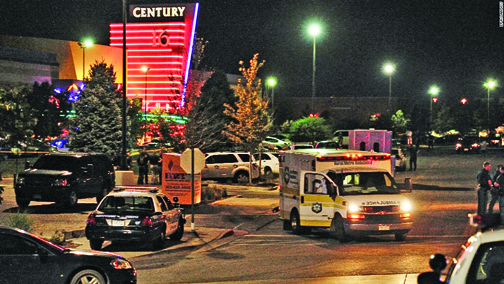
Dark Theater Night: In July 2012 a gunman set off tear gas grenades and shot into the audience killing 12, injuring 70 others.
The audit also identified problems with user access and password setting for the continuity of operations software. The agency agreed to all eight of Auditor O’Brien’s recommendations, including training, regular plan updates and testing for continuity of operations plans.
Auditor O’Brien found that through stronger and more robust continuity of operations plans, agencies throughout the city will be better prepared to continue their operations, provide services and protect city data in the event of a disaster or disruption. The agency has already made significant progress in addressing the audit’s recommendations. “Disasters can cost billions of dollars and devastate lives,” Auditor O’Brien said. “It is important for Denver to be ready for the worst when its residents could need city services the most.”

by Mark Smiley | Dec 17, 2017 | Travel
First National TV Partnership In Domestic Professional Rugby
by Glen Richardson

Nationally Televised: Major League Rugby, which includes the Glendale Raptors, will be broadcast on CBS Sports Network beginning in April 2018. This marks the first national television partnership in the history of American professional rugby.
Major League Rugby (MLR) and CBS Sports Network have announced an exclusive, multi-year television partnership. CBS Sports Network will televise the inaugural season of the new start-up league beginning in April 2018, marking the first national television partnership in the history of American professional rugby.
The Glendale Raptors who call Infinity Park their home were founded in 2007 and now, 11 years later, will be broadcast to all homes carrying the CBS Sports Network. “We are thrilled to announce this partnership,” said Glendale Mayor Mike Dunafon. “The exposure this will give our city is another way we are building upon the vision we had over a decade ago.”
CBS Sports Network will televise a 13-game package with 10 weeks of regular season coverage — highlighted by a Major League Rugby Game of the Week — and two weeks of postseason coverage in 2018, including the semifinals and the first MLR Championship Game.
“We look forward to being the television home of Major League Rugby,” said Dan Weinberg, Executive Vice President of Programming, CBS Sports. “MLR will showcase the speed, power and agility of this exciting sport and we are excited for the launch in April.”
“Partnering with CBS Sports Network is a great step for Major League Rugby and for the sport of rugby in America,” said Major League Rugby Commissioner Dean Howes. “There is no question that rugby is growing fast in the U.S. market. A successful professional league is a critical component of that growth. Television partnerships are incredibly important to any professional league, and we are excited to chart a path to success together with CBS Sports Network.”
Major League Rugby will launch with seven teams in Austin, Houston, Glendale (Colorado), New Orleans, San Diego, Seattle and Salt Lake City (Utah). Each is a key rugby market with a long history of support for the game. The members have strong, local and civic-minded ownership groups with deep ties to their communities and have established grassroots programs, venues in place or in development, and a player pool featuring the best players in North America, reinforced by up to five international signings in the 15-player, Rugby Union format.
For more information on the Glendale Raptors, visit www.glendaleraptors.com. For more information on CBS Sports Network, including a full programming schedule, go to www.cbssportsnetwork.com.
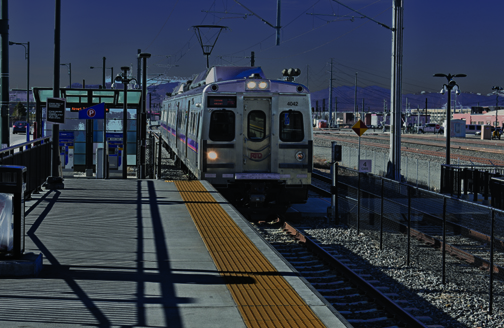
by Mark Smiley | Dec 17, 2017 | Main Articles
‘Train To The Plane’ Terrorizes Neighborhoods
by Mark Smiley

Hellish Nightmare: The A-Line Train To The Plane was to be RTD’s crowning achievement. Instead, it has become the A-Train from Hell for many citizens.
The A-Line train to Denver International Airport (DIA) was supposed to be an exemplary and shining light for RTD’s Light Rail System. However, Front Range citizens were sold a bill of goods in the 2004 election when they approved a tax increase. Voters envisioned a state-of-the-art rapid transit train going from Union Station to DIA. RTD even gave it its highest moniker, The A-Train. But for many citizens of Denver and surrounding communities, it has become the A-Train from Hell.
It has been causing injuries, driving residents from their homes with its loud horns, and has suffered innumerable malfunctions, causing major delays and having passengers miss flights on a regular basis. In fact, the train was struck by lightning twice in 2017 (May and June). The June, 2017 lightning strike forced 81 passengers to be evacuated and walk along a 50-foot-high bridge after a nearly two-hour delay. The entire 23-mile stretch of the A-Line was shut down for close to six hours. Many potential passengers that were relying on this mode of transportation had to find alternative options to the airport.
The reason RTD chose commuter rail over light rail is the ability to run longer stretches of track with fewer stations, travel at speeds up to 80 mph, and have the capacity to transport more passengers. But, the entire system has been a headache for everyone involved since it was launched.
The original plan called for quiet zones but because of countless problems with the crossing technology and switching and signaling, the Federal Railroad Administration (FRA) forced RTD to deploy human beings at each crossing known as the “flag men.” They are stationed at each of the 11 crossings along the A-Line to monitor each train that goes by and ensure automobiles and pedestrians do not cross the track.
RTD pays each flag man $13 per hour and by the time it is all said and done, the total cost of having them at these intersections may come close to $12 million. The flag men are necessary 24 hours per day because of timing glitches on the grade crossings. Part of the timing issue is that the gates are lowered earlier than needed and stay down up to 20 seconds longer than is federally mandated.
The aforementioned quiet zones allow trains to forgo sounding their horns at crossings as long as certain safety measures such as flashers, sturdier railroad gates, upgraded railroad circuitry and raised medians are in place to protect motorists. Up to this
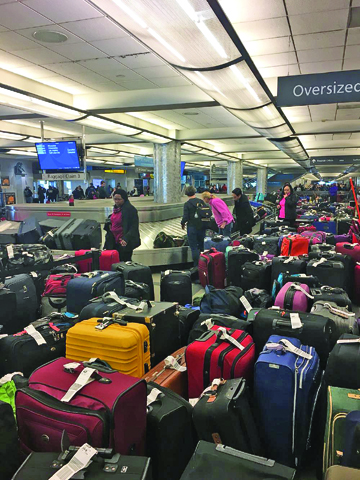
Déjà vu: Many remember the computerized baggage-handling system at DIA and how it was a disaster causing mass chaos and massive delayed luggage retrieval.
point, the FRA has determined that the crossings do not meet these standards. Therefore, the horns must be blown. And, since it started, residents in neighborhoods, such as Park Hill, Clayton and Stapleton, have heard the horns blow almost 340,000 times.
“The Elyria-Swansea and Globeville neighborhoods of Denver have been treated like garbage for generations,” said former Denver City Councilman Ed Thomas. “They have been treated this way for two reasons. Elected officials believe that people that live in those neighborhoods do not matter and they themselves do not live there so they don’t have to live with their decisions.”
This issue has plagued the train since its inception in April 2016. Notwithstanding the fact, that after one year of these glitches which continue to cause delays and scheduling snafus, RTD claims they had solved the problem. Federal regulators signed off on and were satisfied that the timing issues were fixed, bu
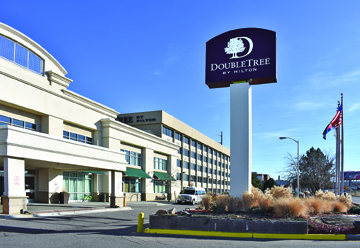
Guest Complaints: Guests of the DoubleTree Hotel, which is situated one block from the train tracks, have complained of the loud horns that blare all evening. The hotel offers sound machines, ear plugs, and box fans to help drown out the deafening noise.
t the Colorado Public Utilities Commission did not agree and denied RTD’s certification the same week back in September 2017.
A hearing on this matter is set for March but might be heard as early as February 15, 2018, if there is no objection from the Union Pacific and BNSF railroads. The Colorado Public Utilities Commission administrative law judge Robert Garvey will hear the case and decide whether the gate crossings are operational and safe. If he rules in favor, the flag men can be removed.
These scheduled hearings, and the fact that the A-Line train that has been blasting through neighborhoods for nearly two years, offer little comfort for residents of Park Hill and surrounding neighborhoods.
The sound of loud train horns bellow through otherwise sleepy neighborhoods. The RTD A-Line Train to Denver International Airport blasts through neighborhoods with horn sounds at a federally mandated 96 decibels. That is comparable to a motorcycle revving up a few feet away. The reason for these horns is due to technological glitches that have tainted the “train to the plane.”
Trains cross these intersections nearly 5,000 times per month and blare the horns four times for a total of 20 seconds each time. The deafening horn has neighbors up in arms. “I can’t believe how loud those trains are and I live seven blocks away,” said Julie Buckner. “There is no break from the noise. It’s constant.” Buckner lives seven blocks away but some homes are just 1-1/2 blocks from the crossings.
The DoubleTree Hotel on the north side of Smith Road on Quebec Street is located just one block from the train tracks and guests of the hotel are surprised when they check in and are offered noise machines, ear plugs, and box fans. “I will never stay at this hotel again,” said Joan Kelleher from Flint, Michigan. “The sound of the train echoed through my room all night long. What is the deal?”
Under the Train Horn Rule (49 CFR Part 222), locomotive engineers must begin to sound train horns at least 15 seconds, and no more than 20 seconds, in advance of all public grade crossings. The maximum volume level for the train horn is 110 decibels which is a new requirement.
RTD has the horns sounds close to the maximum allowed decibels and according to a letter sent to The Denver Post, residents can hear it as far as the Montclair neighborhood which is 25 blocks away at 12th Avenue and Elizabeth Street.
Some residents of Denver are having déjà vu as they remember the baggage claim issues at DIA. The computerized baggage-handling system was an unmitigated disaster whi
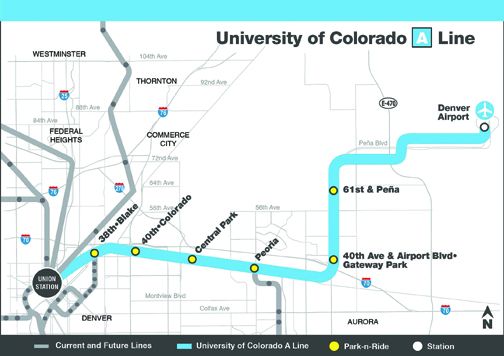
System Failure: RTD operates the 23-mile stretch of the A-Line train from Union Station to Denver International Airport. Many have been affected by the technological glitches that have plagued this system for nearly two years.
ch caused mass chaos. It was plagued by serious mechanical and software problems that has a ripple effect even today.
When the trains in between concourses broke down the day before Thanksgiving in 2017, people wondered if everything DIA is associated with turns sour. If the bad luck continues, RTD’s A-Line Train To The Plane will be next in a long line of failures associated with the airport.

by Mark Smiley | Dec 17, 2017 | Main Articles
by Glen Richardson

Open Season: Paul Rosenthal, a Democrat for House District 9, is faced with sexual harassment claims. Some are saying not all accusations necessarily have merit and that it is open season on some high profile people.
The sexual harassment claims that are sweeping the country have also hit the Colorado legislature with claims made against four different legislators including Paul Rosenthal, a Democrat representing House District 9, which includes Glendale and parts of the Cherry Creek Valley.
Rosenthal who is openly gay initially was accused by Thomas Cavaness, a political organizer for Jared Polis, of inappropriately touching him at a political campaign event some time before he was first elected to the legislature in 2012. The Denver Post came to his defense in a lead editorial asserting that they did not believe “anything in Cavaness’ report precludes Rosenthal from remaining in office. The Post noted that the alleged incident occurred before Rosenthal was elected for the first time in November 2012 and questioned what jurisdiction the Speaker’s Office would have in the first place.
The Denver newspaper noted that the two men had exchanged friendly Facebook messages around the time of the campaign event and that Cavaness couldn’t recall when exactly the harassment occurred.
The publicity of the Cavaness claim caused a second complaint to be filed with Speaker of the House Crisanta Duran, reported first by Fox 31 Denver News. The man is identified only as “Dan” and asserts he was the roommate of Rosenthal back in 2007 and 2008 when he said Rosenthal made “several inappropriate comments” and that he had appeared unannounced while he was sleeping. He said he wrote the complaint to Duran, stating that he could no longer “remain quiet.”
The second complaint was generally greeted with disbelief and derision. Rosenthal’s attorney Harvey Steinberg remarked, “The only thing more ludicrous than this complaint is that FOX 31 would report it.”
Then on November 17, 2017, it was reported in The Denver Post that sometime earlier Heather O’Donnell, an attorney and former legislative policy aide, complained to her boss, Rep. Tracy Kraft-Tharp, that Rosenthal repeatedly attempted to get her to set up a meeting with her brother saying he found him “attractive” and he could help him professionally.
She declared his actions to be “predatory.” Kraft-Tharp in turn reported it to Duran but O’Donnell declined to file a formal complaint. The Speaker’s Office provided Rosenthal with materials concerning workplace and sexual harassment policies.
Anecdotally, the complaints do not appear to be gaining much traction in the 9th District. Sally Perone indicated, “Rosenthal tried to be introduced to somebody’s brother and said something inappropriate to his roommate a decade ago. Is there any human interchange that is not sexual harassment these days? Perhaps politicians deserve it, but this is really open season on them.”
A local shop owner on Colorado Boulevard who did not wish to be identified stated, “It is the season of the witch. The press giving such exaggerated coverage to claims such as those against Rosenthal do a real disservice to the people who have suffered real sexual assault and harassment. The real claims now get lost among all the clutter. It is a real shame.”
Rosenthal who will be up for re-election in 2018 for his final term has always received above 60% in his prior election efforts for the District seat.















